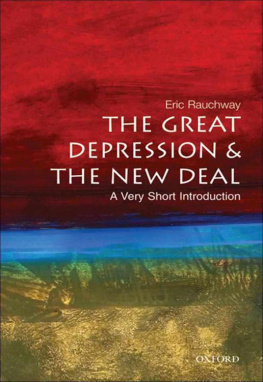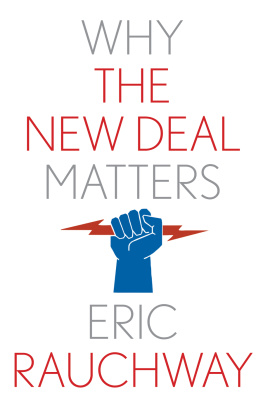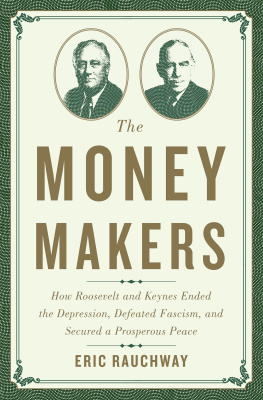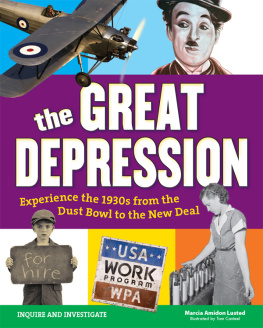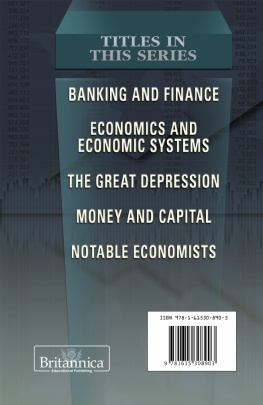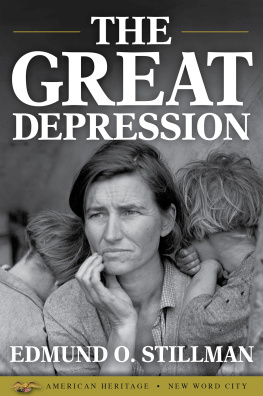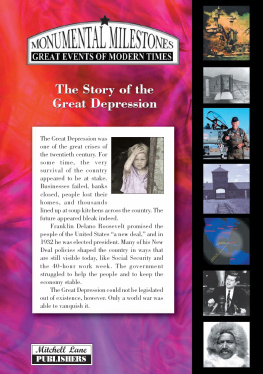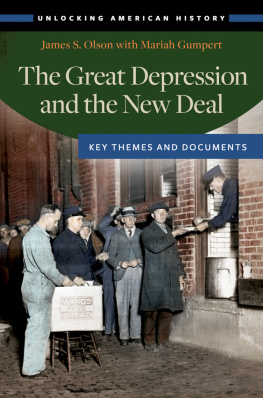Eric Rauchway - The Great Depression and the New Deal: A Very Short Introduction
Here you can read online Eric Rauchway - The Great Depression and the New Deal: A Very Short Introduction full text of the book (entire story) in english for free. Download pdf and epub, get meaning, cover and reviews about this ebook. year: 2008, publisher: Oxford University Press, genre: Politics. Description of the work, (preface) as well as reviews are available. Best literature library LitArk.com created for fans of good reading and offers a wide selection of genres:
Romance novel
Science fiction
Adventure
Detective
Science
History
Home and family
Prose
Art
Politics
Computer
Non-fiction
Religion
Business
Children
Humor
Choose a favorite category and find really read worthwhile books. Enjoy immersion in the world of imagination, feel the emotions of the characters or learn something new for yourself, make an fascinating discovery.
- Book:The Great Depression and the New Deal: A Very Short Introduction
- Author:
- Publisher:Oxford University Press
- Genre:
- Year:2008
- Rating:4 / 5
- Favourites:Add to favourites
- Your mark:
The Great Depression and the New Deal: A Very Short Introduction: summary, description and annotation
We offer to read an annotation, description, summary or preface (depends on what the author of the book "The Great Depression and the New Deal: A Very Short Introduction" wrote himself). If you haven't found the necessary information about the book — write in the comments, we will try to find it.
Rauchway first describes how the roots of the Great Depression lay in Americas post-war economic policies--described as laissez-faire with a vengeance--which in effect isolated our nation from the world economy just when the world needed the United States most. He shows how the magnitude of the resulting economic upheaval, and the ineffectiveness of the old ways of dealing with financial hardships, set the stage for Roosevelts vigorous (and sometimes unconstitutional) Depression-fighting policies. Indeed, Rauchway stresses that the New Deal only makes sense as a response to this global economic disaster. The book examines a key sampling of New Deal programs, ranging from the National Recovery Agency and the Securities and Exchange Commission, to the Public Works Administration and Social Security, revealing why some worked and others did not. In the end, Rauchway concludes, it was the coming of World War II that finally generated the political will to spend the massive amounts of public money needed to put Americans back to work. And only the Cold War saw the full implementation of New Deal policies abroad--including the United Nations, the World Bank, and the International Monetary Fund.
Today we can look back at the New Deal and, for the first time, see its full complexity. Rauchway captures this complexity in a remarkably short space, making this book an ideal introduction to one of the great policy revolutions in history.
About the Series: Oxfords Very Short Introductions offers concise and original introductions to a wide range of subjects--from Islam to Sociology, Politics to Classics, and Literary Theory to History. Not simply a textbook of definitions, each volume provides trenchant and provocative--yet always balanced and complete--discussions of the central issues in a given topic. Every Very Short Introduction gives a readable evolution of the subject in question, demonstrating how it has developed and influenced society. Whatever the area of study, whatever the topic that fascinates the reader, the series has a handy and affordable guide that will likely prove indispensable.
Eric Rauchway: author's other books
Who wrote The Great Depression and the New Deal: A Very Short Introduction? Find out the surname, the name of the author of the book and a list of all author's works by series.

